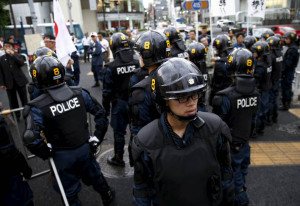
The main news is that the ruling Saenuri party has regained the parliamentary majority due to “return” of certain independent deputies to the fold. On June 16 the party committee held a meeting where the decision on party renewal was made despite the negative forecasts. Predominantly, these are the Conservative representatives, who left the party when they disagreed with Park Geun-hye’s policies that they felt were too soft. For example, the four returnees include Yu Seung-min, who had tried to restrict her powers as we wrote back thenn. He then resigned as leader of the parliamentary faction of the ruling party and left the party entirely. Park Geun-hye called him a traitor and his return suggests that the ruling party is not being run by her supporters or for the sake of regaining control over the parliament even such an odious politician could be returned.
A week later, a further three previously independent deputies returned to Saenuri. Thus, the ruling party increased its number of seats in the National Assembly to 129, which meant that they regained the parliamentary majority.
However, the question of who Park Geun-hye’s successor will be remains unanswered. Prime Minister Hwang Kyo-ahn is evading direct questions and it is no surprise: he was recently pelted with bottles of water and eggs by anti-THAAD protesters. It is said, that Hwang Kyo-ahn’s participation in the presidential election is not even being discussed. UN Secretary General Ban Ki-moon is not making any bold statements either. Though, on May 25, 2016, during a visit to his homeland, he made tentative comments that he was giving some thought about what he will do after January 1 next year when his term of office as Secretary General of the United Nations comes to an end and he will become a South Korean citizen. “I’ll decide what I want do when I am just a Korean citizen. If necessary, I’ll even ask for your advice.” “I have been the UN Secretary-Genera
However, 5 days later he expressed bewilderment regarding the media sensation and requested that people refrain from making exaggerated interpretations of his statements and expressed his hope that his activities during his visit to South Korea would not cause more confusion. However, when he was Minister of Foreign Affairs of South Korea, Ban was nicknamed “the slippery eel” by journalists for his habit of talking very vaguely. Therefore, his statement was regarded as “unequivocal proof of his presidential ambitions.” It remains to be seen which party will be able to attract him to the fold.
It is worth paying attention to the ongoing controversy in the National Assembly surrounding parliamentary immunity: the abolition of parliamentary benefits and privileges was proposed by the Saenuri party almost immediately after the election of a new National Assembly. The discussion was spurred by a scandal surrounding a deputy from the opposition Democratic Party, Toburo, Joo Eun Chung. On June 30, the deputy accused a certain member of the Sentencing Commission under the Supreme Court of South Korea, former employee of the MBC television company, of sexual harassment. The television company refuted the charges and the deputy apologised but the South Korean general public and other deputies of the National Assembly demanded that the deputy be punished for spreading false information.
In accordance with Article 45 of the Constitution of South Korea, no member of the National Assembly shall be held responsible outside the National Assembly for opinions officially expressed or for votes cast in the National Assembly. Then the Saenuri party pointed out that parliamentary immunity does not release a deputy from legal liability but provides for the special procedure of its application, and deputies’ liability for spreading false information is a reason to restrict it.
Moreover, members of parliament have agreed to add amendments to the relevant legislation that stipulate that a deputy suspected of a crime should appear in court and before investigating authorities. If the deputy suspected of a crime refuses to appear, he or she will be subject to review by the disciplinary committee of the National Assembly.
Finally, there is currently another round of (as yet) informal appeals to amend the Constitution to allow the president to run for a second term. Those making the appeals explain them thus: this decision has been made in most civilized countries (primarily the United States), and that the 5-year term with no right to re-election was a good “measure against tyranny” after the military rule but the situation has changed and cons have started to outweigh the pros. The president has no time to undertake long-term projects and there is no motivation to work for the benefit of the country, since a second term clearly shows the level of trust the politician has gained among the population. However, there is no discussion of this at the official level and if, by some miracle, these amendments would be made, they would in all likelihood affect the next president.
Konstantin Asmolov, Ph.D. in History, Chief Research Fellow at the Center for Korean Studies of the Institute of Far Eastern Studies of the Russian Academy of Sciences, exclusively for the online magazine “New Eastern Outlook”
